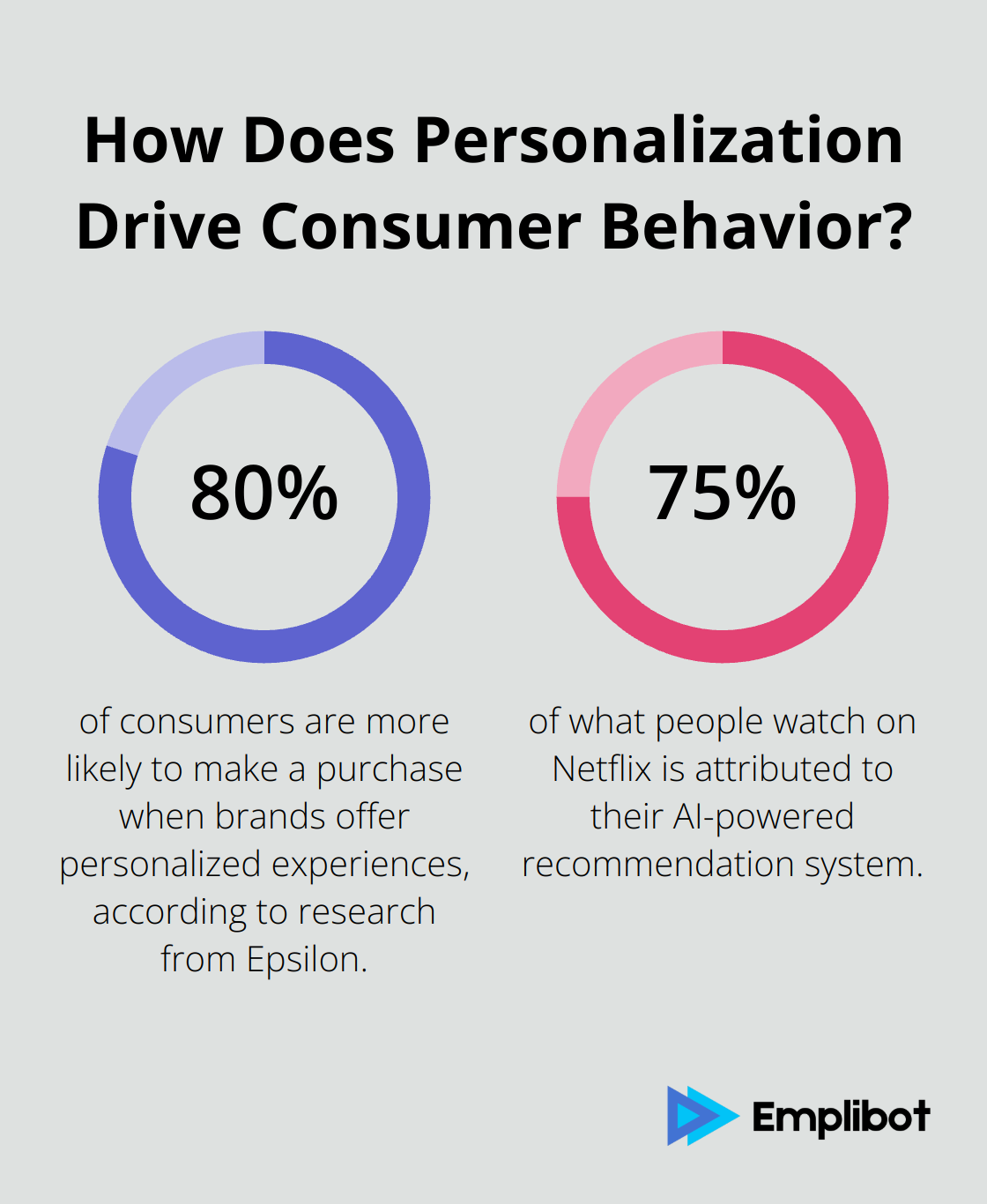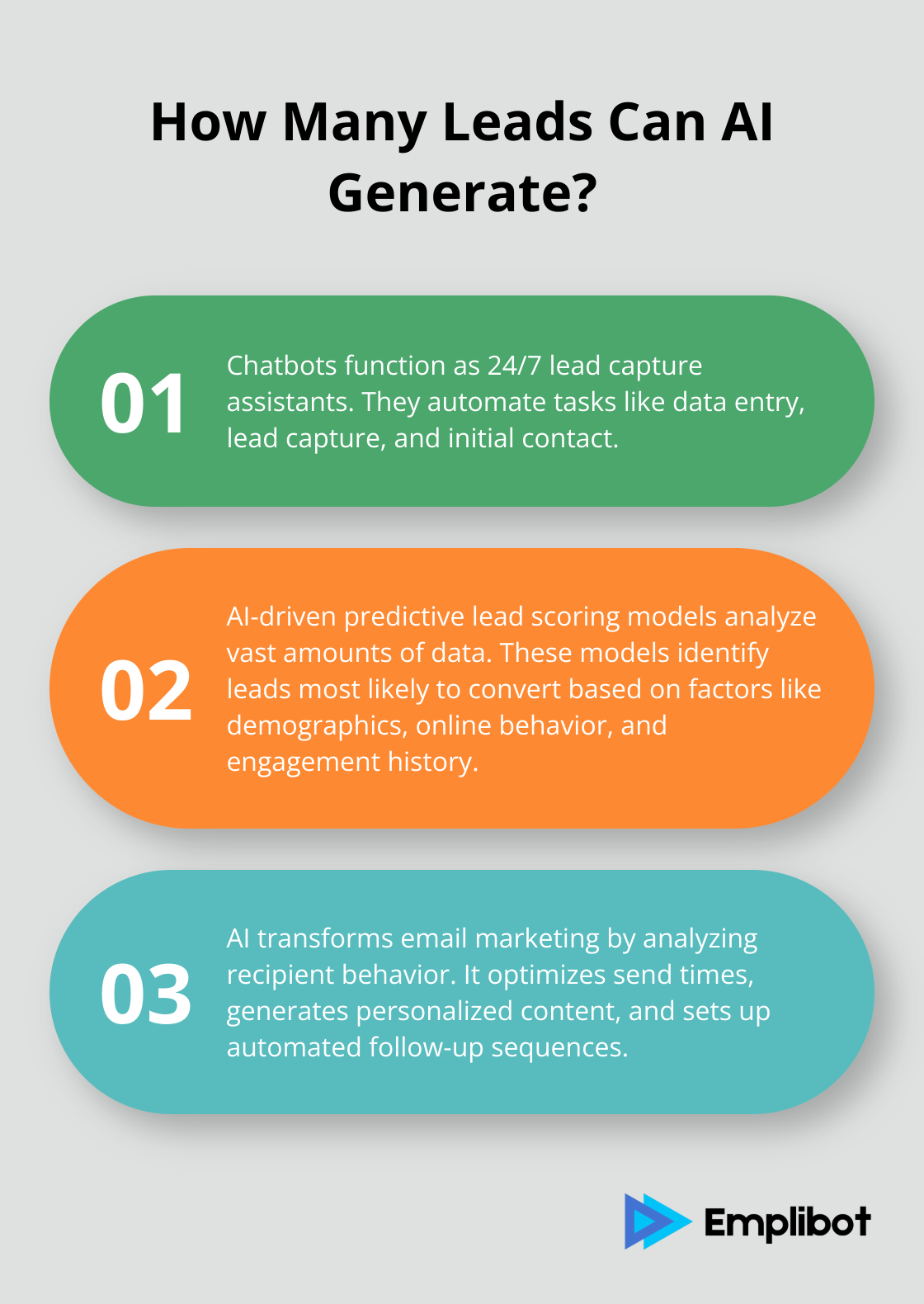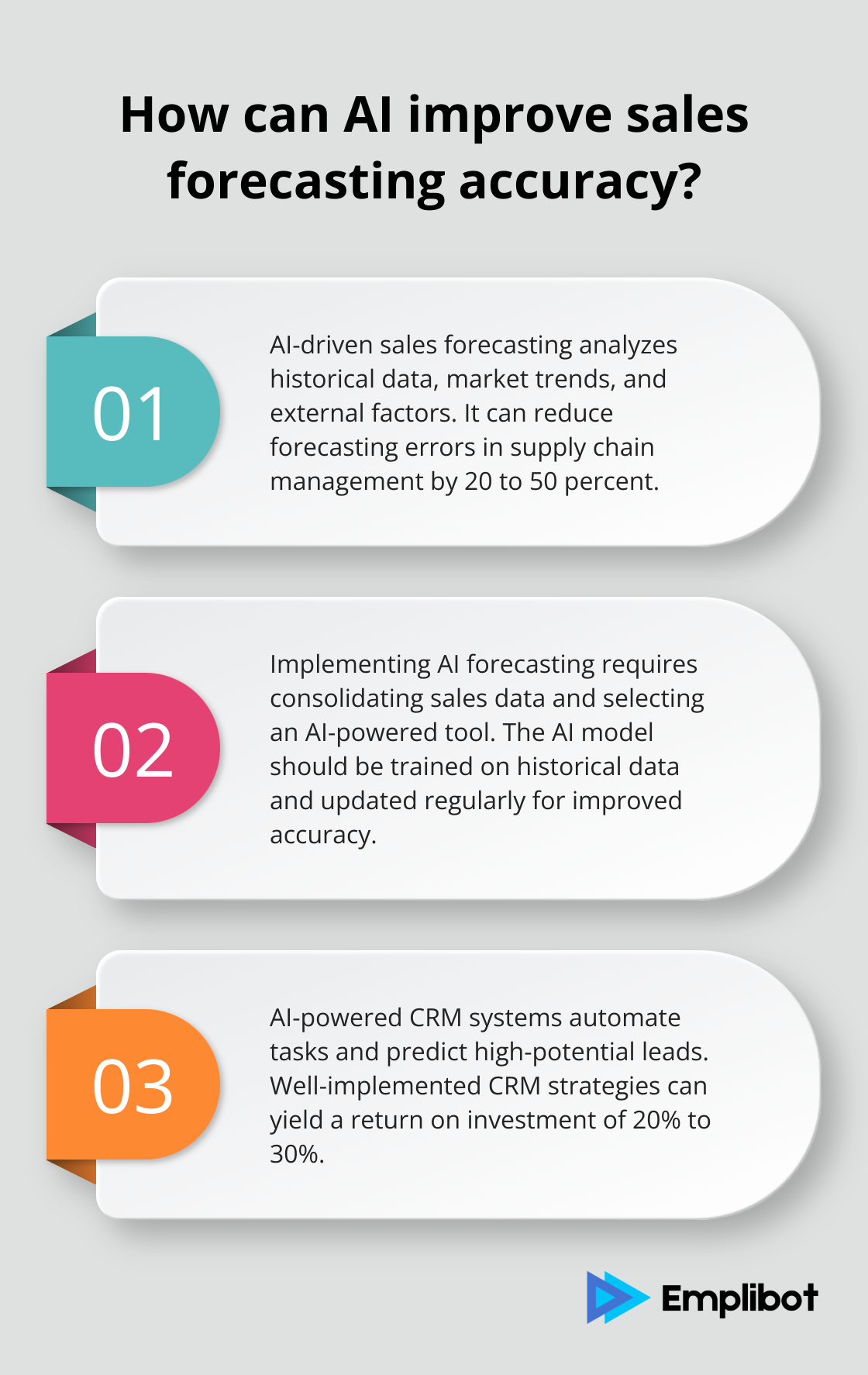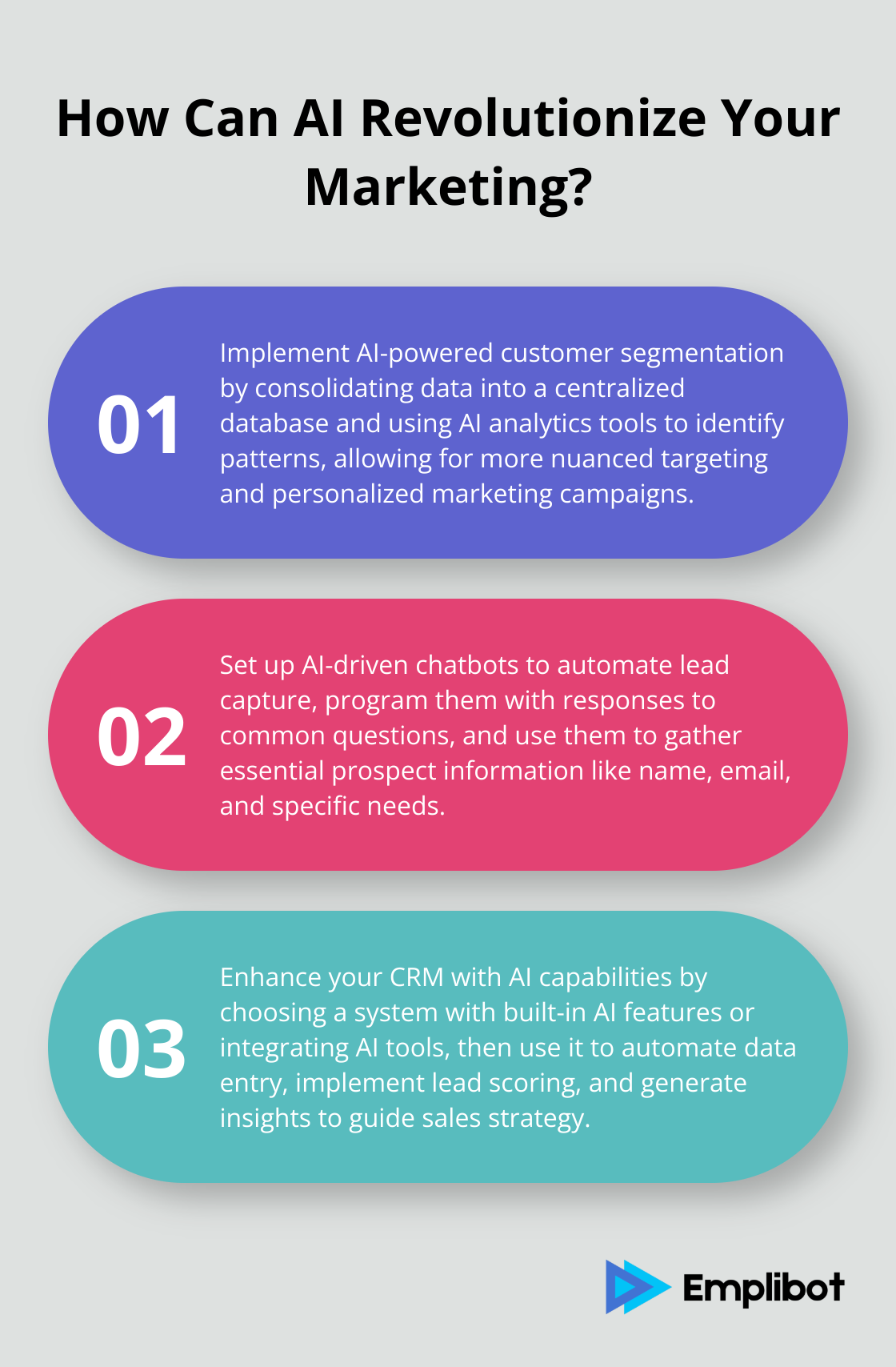AI tools for sales and marketing are revolutionizing how businesses connect with customers and drive growth. These powerful technologies offer unprecedented opportunities to streamline processes, enhance targeting, and boost overall performance.
At Emplibot, we’ve seen firsthand how AI can transform sales and marketing strategies. In this post, we’ll explore practical ways to leverage AI for customer segmentation, lead generation, and sales optimization, helping you achieve remarkable results in today’s competitive landscape.
How AI Revolutionizes Customer Segmentation
AI-powered customer segmentation and personalization transform modern sales and marketing. These technologies dramatically improve customer targeting and engagement.
Precise Customer Profiling with AI
AI algorithms analyze vast amounts of customer data to create highly accurate profiles. These profiles extend beyond basic demographics, incorporating behavioral patterns, purchase history, and social media activity. A study by McKinsey found that companies using AI for customer segmentation saw a 10-15% increase in marketing ROI.

To implement this, consolidate your customer data from various sources into a centralized database. Then, use AI-powered analytics tools to identify patterns and segment your customers based on multiple factors. This approach allows for much more nuanced targeting than traditional methods.
Creating Hyper-Personalized Campaigns
With AI-driven segmentation, you can create highly personalized marketing campaigns that resonate with each customer group. Research from Epsilon indicates that 80% of consumers are more likely to make a purchase when brands offer personalized experiences.
Use AI to tailor your messaging, offers, and even product recommendations for each segment. For instance, an e-commerce company might use AI to analyze past purchases and browsing behavior to suggest products that a customer is most likely to buy.
AI-Powered Recommendation Engines
AI recommendation engines take personalization a step further by providing real-time, individualized suggestions to customers. Netflix, for example, attributes 75% of what people watch to their recommendation system.
To leverage this in your business, consider implementing an AI-powered recommendation engine on your website or in your app. This can significantly boost customer engagement and increase cross-selling and upselling opportunities.
Balancing AI and Human Touch
While AI provides powerful tools for segmentation and personalization, it’s important to maintain a human touch in your marketing efforts. Use AI to enhance your strategies, but don’t lose sight of the importance of genuine human connections in building lasting customer relationships.
As we move forward, it’s clear that AI-powered customer segmentation and personalization are just the beginning. The next frontier in AI-driven sales and marketing lies in lead generation and qualification. Let’s explore how AI tools can revolutionize these critical processes.
How AI Transforms Lead Generation and Qualification
Chatbots: Your 24/7 Lead Capture Assistants
AI-powered chatbots transform the way businesses interact with potential customers. These virtual assistants excel in automating time-consuming, manual tasks involved in lead generation, such as data entry, lead capture, and initial contact. This automation not only captures leads but also provides valuable insights for your sales team.

To implement chatbots effectively:
- Identify the most common questions your prospects ask
- Program your chatbot to provide helpful responses
- Use the chatbot to gather essential information (name, email, specific needs)
Predictive Lead Scoring: Focus on High-Value Prospects
AI-driven predictive lead scoring models analyze vast amounts of data to identify the leads most likely to convert. Lead scoring is an objective ranking of one sales lead against another. It not only helps align the right follow-up to the corresponding inquiry but also considers factors such as demographic information, online behavior, and engagement history to assign a score to each lead.
To implement predictive lead scoring:
- Define what constitutes a qualified lead for your business
- Work with your data science team or an AI service provider to develop a model that incorporates relevant data points
- Refine your model regularly based on actual conversion data to improve its accuracy over time
AI-Powered Email Marketing: Automate Follow-ups
AI also transforms email marketing, making follow-up processes more personalized and effective. AI algorithms analyze recipient behavior, optimize send times, and even generate personalized email content.
To leverage AI in your email marketing:
- Use AI tools to segment your email list based on recipient behavior and preferences
- Implement AI-powered subject line optimization to increase open rates
- Personalize email content based on each recipient’s interests and past interactions
- Set up automated follow-up sequences that adapt based on recipient engagement
Balancing AI and Human Touch
While AI provides powerful tools for lead generation and qualification, it’s important to maintain a human touch in your sales processes. Use AI to enhance your strategies, but don’t lose sight of the importance of genuine human connections in building lasting customer relationships.
As we explore the potential of AI in sales, let’s turn our attention to how these technologies can optimize your overall sales processes (including forecasting, pricing, and productivity enhancements).
How AI Supercharges Your Sales Process
Forecasting Sales with Precision
AI-driven sales forecasting revolutionizes business operations. It analyzes historical data, market trends, and external factors (like economic indicators) to predict future sales with remarkable accuracy. Applying AI-driven forecasting to supply chain management can reduce errors by between 20 and 50 percent.

To implement AI-driven forecasting:
- Consolidate your sales data from various sources into a centralized system.
- Select an AI-powered forecasting tool that integrates with your existing CRM.
- Train the AI model on your historical data (including won and lost deals, sales cycles, and customer attributes).
- Update the model regularly with new data to improve its accuracy.
Optimizing Prices Dynamically
AI-powered pricing optimization allows you to set competitive prices in real-time, based on market demand, competitor pricing, and customer behavior.
To leverage AI for pricing optimization:
- Collect and centralize your pricing data (including historical prices, sales volumes, and competitor prices).
- Implement an AI-powered pricing tool to analyze this data and recommend optimal prices.
- Test your AI pricing strategy on a small product segment before a broader rollout.
- Monitor results closely and adjust your strategy as needed.
Enhancing CRM with AI Power
AI-powered CRM systems transform how sales teams work. These intelligent systems automate routine tasks, provide actionable insights, and predict which leads are most likely to convert. McKinsey & Company’s research reveals that a well-implemented CRM strategy can yield a return on investment of 20% to 30%.
To enhance your CRM with AI:
- Choose a CRM system with robust AI capabilities (or integrate AI tools with your existing CRM).
- Use AI to automate data entry and enrichment, freeing up your sales team’s time for high-value activities.
- Implement AI-powered lead scoring to help your team focus on the most promising opportunities.
- Use AI-generated insights to guide your sales strategy and tactics.
Automating Follow-ups with AI
AI transforms follow-up processes, making them more personalized and effective. AI algorithms analyze recipient behavior, optimize send times, and even generate personalized email content.
To leverage AI in your follow-up strategy:
- Use AI tools to segment your contact list based on behavior and preferences.
- Implement AI-powered subject line optimization to increase open rates.
- Personalize content based on each recipient’s interests and past interactions.
- Set up automated follow-up sequences that adapt based on recipient engagement.
Balancing AI and Human Touch
While AI provides powerful tools for sales optimization, maintaining a human touch in your processes remains important. Use AI to enhance your strategies, but don’t overlook the importance of genuine human connections in building lasting customer relationships.
Final Thoughts
AI tools for sales and marketing have transformed how businesses connect with customers and drive growth. These technologies offer unprecedented opportunities to streamline operations and boost performance through precise customer segmentation, automated lead generation, and optimized sales processes. However, implementing AI tools presents challenges such as data quality concerns and the need for additional training for sales and marketing teams.

The future of AI in sales and marketing promises even more sophisticated tools for customer insights, predictive analytics, and personalized marketing. Companies must find the right balance between AI-driven efficiency and the human touch that remains essential in building lasting customer relationships. As AI technologies evolve, businesses that embrace these tools will gain a competitive edge in the increasingly digital landscape.
For businesses looking to harness the power of AI in their content marketing efforts, Emplibot offers a comprehensive solution. Emplibot helps businesses increase their online presence and drive more traffic, leads, and sales by automating various aspects of content marketing. As we move forward, leveraging AI tools for sales and marketing will become essential for companies aiming to unlock new levels of efficiency, personalization, and growth in their strategies.

